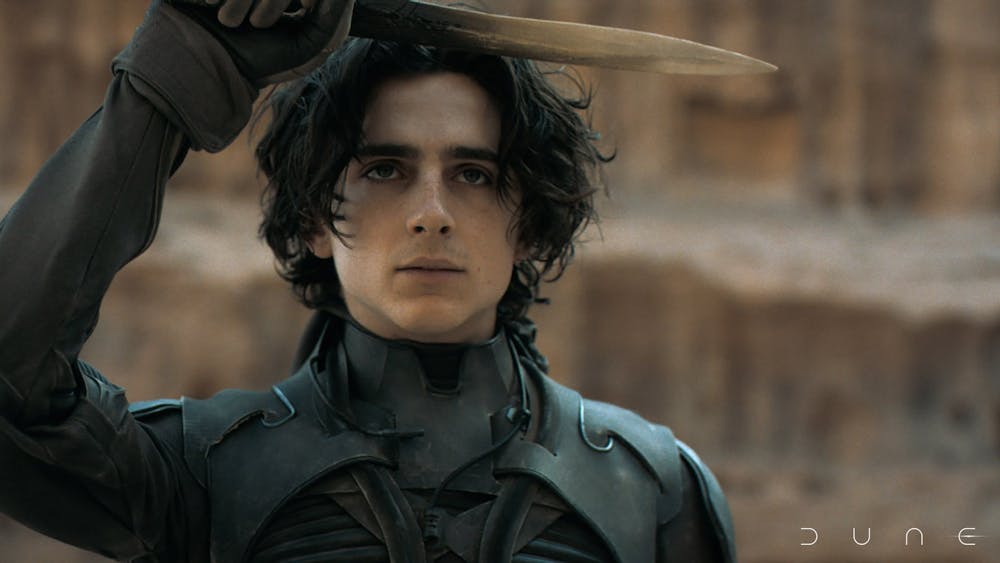After a year of delays and patient, painful anticipation, director Denis Villeneuve’s “Dune” finally made its way to the American silver screen this past weekend. As it is referred to in the title sequence, “Dune: Part One” is based on the first half of Frank Herbert’s seminal science fiction novel, “Dune,” published in 1965.
The film follows Paul Atreides (Timothée Chalamet), son of Leto Atreides (Oscar Isaac), Duke of Caladan and leader of one of the galactic empire’s noble houses. The Atreides’ are granted control over Arakkis, a resource rich, barren desert planet previously controlled by the Harkonnens, a rival house of the Atreides who are unhappy about the handoff initiated by imperial hands.
Paul’s mother, Lady Jessica (Rebecca Ferguson), is a member of the Bene Gesserit, a mysterious sisterhood that possesses physical and mental powers that would seem like magic to outsiders. Lady Jessica was meant to bear a daughter as part of the Bene Gesserit’s breeding program, but her love for Duke Leto resulted in her having a son believed to be the Kwisatz Haderach, a kind of messiah in the Bene Gesserit religion.
If all this exposition sounds like a convoluted mess of gibberish conjured up at a late night Dungeons and Dragons campaign, that’s because, on paper, it kind of is. “Dune” is so vast and deep that any simple attempt to relay its plot points fails to reach the core of its brilliance. The genius of Herbert’s writing — and now by extension, Vileneuve’s filmmaking — is that this seemingly convoluted plot is expressed as a harmonic balance between a high-stakes political thriller and an intimate story about a mother and son.
“Dune” operates on two levels: the personal and the political. In its interest in families vying for power, the politics of “Dune” feel very much like a galactic “Game of Thrones.” There is an apparent power struggle between the Atreides and the Harkonnens, all while the empire and the Bene Gesserit pull the strings behind the scenes. The politics in the film are compelling, though perhaps a bit shallow when compared to the source material.
Stellan Skarsgård steals every scene as Baron Harkonnen, the head of the rival Harkonnen family. His convincing performance as a villain is made more believable by the excellent work from the film’s hair and makeup team, which creates an unsettling screen presence that you can’t help but be totally enthralled by. The downside, however, is that he is only in three or four scenes.
This rings true for essentially the entire cast. Zendaya’s Chani, Javier Bardem’s Stillgar and Dave Bautista’s Rabban Harkonnen are all fascinating characters but are essentially rendered glamorized extras in this film. For a film on such an epic scale, the scope of this story is incredibly focused, spending most of its time on Paul and Lady Jessica along with substantial features from Duke Leto, Duncan Idaho (Jason Momoa) and Gurney Halleck (Josh Brolin).
Despite the initial disappointment that “Dune” is not the massive ensemble piece trailers made it out to be, the narrative’s intimate scale against the backdrop of galactic conflict is what makes the film so stellar. Momoa is the human heart of this story, and his performance offers an empathy that is incredibly refreshing against the mostly stoic performances from the other actors. Brolin and Isaac deliver performances so grounded in reality that you’ll have to remind yourself they’re actually on a planet called Arrakis trying to avoid massive sandworms so as to harvest natural resources and secure their wealth.
But ultimately, this film is Chalamet and Ferguson’s, and they deliver on a monumental level. Their lone trekkings across the barren desert fighting for survival command the IMAX screen. Even when the film cuts back and forth between big battles and intimate relations, “Dune” maintains a consistent tone: the magnanimity of the battles is equally matched by the magnanimity of the struggle for survival.
Though “Dune” was given a same-day release on HBO Max, it would be an utter disservice to this film to not to witness it on the biggest screen possible, as cliché as it may sound. Denis Vileneuve harnesses the scale of the IMAX screen so flawlessly that it is impossible not to bear an immovable grin during the entirety of the 155 minute run time. Vileneuve’s masterful vision is perfectly complemented by both the sleek and breathtaking cinematography of Greig Fraser and a score by Hans Zimmer that will resonate with viewers for weeks on end.
Take out all of the brilliant acting and compelling story and you have one of the greatest audio-visual experiences that could possibly be put on film. Now, add all of that back, and you are presented with what is very easily one of the greatest science fiction films ever made. Now try to contain your excitement that this is only half of a movie — the greatest parts of Herbert’s novel are still left to be adapted. As viewers leave the theater, they will have to cling on to Chani’s very apropos words: “This is only the beginning.”

Finn Kirkpatrick was the senior editor of multimedia of the Brown Daily Herald's 134th editorial board. He is a junior from Los Angeles, California studying Comparative Literature and East Asian Studies. He was previously an arts and culture editor and has a passion for Tetris and Mario Kart.





